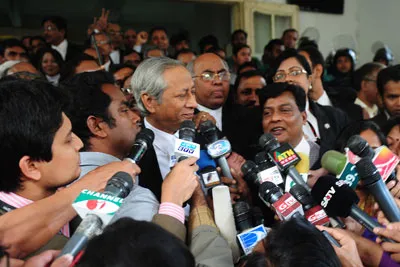This week, Prime Minister Sheikh Hasina’s cabinet approved a restrictive policy governing Bangladesh’s broadcast media. While the policy calls for the creation of an independent commission to oversee electronic media–a positive step, in principle–it’s unclear how and how quickly the commission will be formed. Meanwhile, the policy restricts what can be broadcast, raising red flags.
Under the policy, broadcast outlets are prohibited from disseminating any news, photos, or videos that could tarnish the image of law enforcement agencies and armed forces, according to news reports. The policy also requires broadcast outlets to telecast programs of national importance, including speeches made by the heads of state and government. It prohibits any broadcasts that, directly or through advertisements, run counter to the government (emphasis added) or public interest, and forbids the broadcasting of news that could cause “communal discord” or impede national security, according to reports.
The policy also calls for the creation of a statutory independent commission to implement these provisions. The commission would be tasked with drafting a “code of guidance” for media outlets and elaborating on penalties for breaching the policy, news reports said. While the commission would be able offer recommendations, the government would retain the authority to impose punishment for non-compliance and “…supervision and control will remain in the government’s hands,” according to news reports.
Cabinet Secretary M. Mosharraf Hossain Bhuiyan told reporters that the commission would have the authority to issue licenses for television and radio outlets–a process that has been under the auspices of the government.
Bhuiyan also told reporters that in the interim, the policy will be implemented by the information ministry. In an interview with a private channel, Information Minister Hasanul Haq Inu estimated that forming a commission would take no more than five months.
Several journalists said the policy raises deep concern. Shortly before it was approved by the cabinet, an editorial published by Prothom Alo, one of the most widely circulated newspapers in Bangladesh, stated: “To all appearances, this is a precursor to granting indemnity to certain institutions.” The editorial added that the provision to form a broadcast commission is “aim[ed] at tying up the hands and feet of the media. Such a restrictive policy is totally unacceptable.”
The editorial also rightly raised concern over a provision that it said bars broadcast of any statement or picture that may tarnish the image of a government official with judicial powers. We have already seen the judiciary attempt to muzzle critical voices in Bangladesh.
The uncertainty over when the commission will be formed has prompted journalists to demand it be created immediately. Meanwhile some journalists have set fire to copies of the policy in protest.
Manjurul Ahsan Bulbul, CEO of Boishakhi Television and president of a faction of the Bangladesh Federal Union of Journalists (BFUJ) told Prothom Alo, “The government hasn’t even decided how it will form the commission. What has been stated so far–that will simply increase the Information Ministry’s control.”
The policy has also drawn stern criticism from the opposition Bangladesh Nationalist Party. The party’s Joint Secretary General Ruhul Kabir Rizvi told reporters, “We believe they are actually trying to use laws to put the entire media inside the government’s cage.”
Bhuiyan denied these criticisms, saying, “Robbing media of its freedom is out of the question.”
The policy has prompted positive reactions from some quarters. Tahmina Rahman, director for Bangladesh and South Asia at Article 19, one of the groups that offered input in the drafting process, expressed optimism. “This would be a significant attempt toward distancing the government from functions of the electronic press through this independent commission,” Rahman told CPJ by phone. “Despite some weaknesses, a process has been put into place.”
